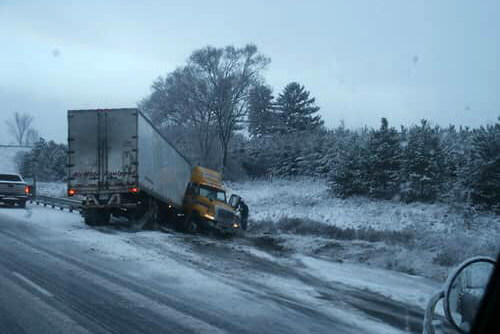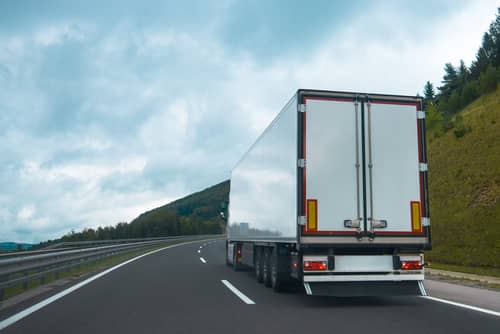Feeling uneasy whenever you’re sharing the same road with a big rig or a massive vehicle is understandable. The sheer size of the vehicle nearby may make you wary of a possible jackknife accident taking place.
Truthfully, any accident involving a truck is a serious cause for concern. If a truck driver loses control or crashes for any reason, the consequences could be dire.
It depends on everyone on the road to be more careful so you can prevent those types of accidents. For this article, we’ll focus more on jackknife accidents. We’ll discuss how they occur, the damage they cause, and how you can avoid them.
What Is a Jackknife Accident?
To get started, let’s first define what a jackknife accident is. Jackknife accidents describe those occurrences during which the front of the vehicle and the trailer suddenly stop moving in unison. Instead of the attached trailer continuously moving behind the vehicle, it may suddenly start going in different directions.
There are different reasons why drivers may lose control of the trailer attached to their vehicle, and we’ll get to those a bit later in the article. With the attached trailer now out of control, it could end up sliding to the side of the vehicle.
The trailer could form an “L” or “V” shape along with the front of the truck. The reason why this type of occurrence is referred to as a jackknife accident is due to the angles that the trailer forms with the vehicle. It closely resembles those folding blades that some hobbyists, hunters, or campers may use.
Jackknife accidents aren’t limited to big trucks. They can also involve smaller vehicles that come with trailers attached. Jackknife accidents are more dangerous when larger vehicles are involved.
What Causes Jackknife Accidents?

Jackknife accidents are scary, and it would be in everyone’s best interests to understand them better. Finding out how they occur would be helpful in that regard.
According to How Stuff Works, those types of accidents usually occur due to the vehicle and/or its connected trailer losing traction.
To achieve adequate traction, you need plenty of static friction between the ground and the tires. That static friction emerges between the wheel’s point of contact which is technically static and the ground. More static friction means the tires have a better chance of staying where they should be, thus keeping the truck and the trailer in their right positions.
So, what happens if the tires suddenly lose the right amount of static friction? Often, that means that they will start to slide. You’re not getting traction anymore. Instead, the force keeping the tires in place is sliding.
That’s a problem because sliding friction doesn’t offer as much grip compared to static friction. The lack of adequate friction can lead to the trailer going out of place, moving to the side of the truck, and causing destruction in the process.
What Leads to the Loss of Static Friction?
Now that we know how important static friction is for the truck and trailer’s wheels, we’ll identify the reasons why it can happen while driving. Listed below are some of the most common explanations.
The Brakes Were Not Properly Applied
Big trucks don’t work the same way as the more ubiquitous passenger vehicles, especially when it comes to matters such as brakes. If you’re in a typical car and you suddenly slam on the brakes, you may skid forward a bit, but your vehicle will come to a halt. The same thing won’t necessarily happen if you’re driving a truck.
After slamming on the brakes, they may lock up, but your vehicle may still be moving forward. What’s even more concerning is that only the front tires may have been the ones that locked up. The rear tires may still be moving after you applied the brakes, and the momentum could propel them forward when the rest of the vehicle stops.
It’s a situation that could easily lead to a jackknife accident.
The Roads Are Slippery
There’s a reason why road advisories are usually issued whenever it rains or snows in an area. Roads that have layers of water or ice are more dangerous for driving.
Most of us like driving over paved roads that look super smooth, but the reality is there are small openings along the surface of the road that creates friction. You won’t feel them while driving, so your ride will still feel smooth and comfortable.
The problem is that when the roads have water, those small openings fill in, and the surface becomes smoother than intended. It becomes harder for your tires to maintain a solid grip with the road in that scenario because of the lack of static friction. As we’ve established already, less static friction is bad news for your vehicle.
The Truck Is Going Too Fast
Truck accidents can also be a byproduct of the vehicle going too fast. Think of the machine you’re operating here. It’s a mammoth vehicle that can plow through road barriers and property because of its sheer size.
Now imagine trying to stop a vehicle of that size if it’s moving fast. It will require an enormous amount of force to stop.
If you’re driving the truck at high speeds, you’re putting your brakes in a position to fail. They likely can’t stop a truck that is barreling down the road at alarmingly high speeds. When you try to stop, the trailer will likely fly out and jackknife.
The Truck Turns Too Quickly
Turning your truck too quickly is another potential cause of a jackknife accident. Vehicles will swing out if you are too quick to turn the wheel. This can happen in a normal passenger vehicle.
If it happens with a truck, the whole thing could be more destructive. The trailer may act almost like a tail whipping around as the truck turns in one direction. This movement could damage smaller vehicles in the path of the trailer.
The Trailer Is Empty
An empty trailer is more prone to jackknifing. Heavier trailers create more friction with the road. Lighter trailers are more likely to move forward accidentally.
Of course, loading up the trailer with too much cargo is also not a good thing. Overloaded trailers become more prone to rolling over, which is a problem itself.
How Damaging Can Jackknife Accidents Be?
Jackknife accidents can be disastrous. It’s not only the people in the truck who are in danger but other drivers and pedestrians can get caught up in the carnage.
The trucks are dangerous on their own. They can easily wipe out several vehicles in front of them because of their size. Trucks can also destroy the roads and any pieces of private property nearby.
The trailer is as threatening and what makes them even more dangerous is that they can catch other drivers off guard. Some drivers may see the truck crash beside them and think they’re in the clear only for the trailer to prove them wrong.
It’s easy to see how these accidents can quickly become fatal. It’s also easy to see why we should all do what we can to prevent them from happening.
How to Prevent Jackknife Accidents as the Driver of the Truck

You must never take the destructive force of a jackknife accident lightly. For those who get behind the wheel of a truck regularly, knowing how to prevent those accidents is essential.
Listed below are some tips that should help drivers prevent those accidents from taking place.
Go Through a Proper Training Program
We’ve already touched on it earlier, but trucks do not work the same way as most passenger vehicles. You must control them to keep them upright and safe.
That is something you must acknowledge as a prospective commercial truck driver. You cannot assume that your years of driving typical passenger vehicles have prepared you for the bigger trucks. Undergoing specialized training for driving trucks is the smart move, and in some cases, they require it.
Check Road Conditions ahead of Time
Are you scheduled to go on the road sometime soon? If so, take a moment to look up any traffic advisories before you set out on the road. Rain or snow passing through the area may affect the roads, and they could be hazardous to drive on.
You don’t necessarily have to refrain from driving if you find out that the roads are wet and slippery. Still, you may want to leave earlier than originally planned to ensure that you reach your destination on time without having to drive at high speeds on wet roads.
Turn with Caution
Sharp turns are always hard to navigate for big trucks. Make things easier for yourself by being more careful while navigating them.
Start to slow down as you approach the sharp turn and carefully move the steering wheel in the right direction. A more careful approach could help you avoid a jackknife accident.
Maintain the Truck You’re Driving
You can do everything right as a driver and still cause an accident. In a scenario such as that, the problem is likely related to the truck itself.
The wheels on the truck may be worn down to the point where they are too smooth to be safe. Your brakes may also be malfunctioning. Those are some of the issues you can spot during maintenance that can cause issues when you’re driving.
Take care of them before you leave to increase the chances of your journey being a safe one.
Never Get behind the Wheel of the Truck if Your Senses Are Impaired
One last tip for truck drivers out there: Don’t get in the driver’s seat if you’re not in the right condition. Driving under the influence is always a bad idea, but so is driving when you’re tired. After a long day of driving, get some sleep before you hit the road again.
How to Avoid Jackknife Accidents if You’re in a Passenger Vehicle
In many ways, drivers of passenger vehicles are at the mercy of truck drivers whenever they share the same road. Even so, there are things you can do to protect yourself. To be more specific, you’ll want to engage in defensive driving.
The Federal Motor Carrier Safety Administration (FMCSA) has offered some defensive driving tips that will come in handy if you ever find yourself next to a truck. The FMCSA reminds drivers of passenger vehicles to give trucks plenty of clearance around turns and curves. Doing so will keep you protected from the trailer possibly whipping around.
They also warn drivers of passenger vehicles to practice patience whenever they are close to trucks. As we’ve already discussed in this article, going fast is not safe for most truck drivers. It’s one of the reasons why they get into jackknife accidents in the first place.
In general, being more cautious when you see a truck on the road is a good idea. You may need a bit more time to reach your destination, but you’ll also be safer that way.
Who Should I File against if I’m Involved in a Jackknife Accident?
When filing a case following a jackknife accident, remember to include both the commercial truck driver and the company itself. Failing to name the appropriate defendants in time could lead to problems down the line. For instance, you may not receive the due compensation from the owner of the truck if you failed to name them in the lawsuit earlier.
Make sure you work with an experienced lawyer so that the filings are correct.
Dealing with the aftermath of a jackknife accident can be an enormous challenge. The serious injuries you sustain may make it difficult for you to move forward with any legal proceedings on your own.
Ease your burden effectively by getting in touch with the right lawyer. We at the Saeedian Law Group are ready to offer our legal expertise to all accident victims. Contact us as soon as you can after the accident so we can start working on your case.
